- Region
- Águilas
- Alhama de Murcia
- Jumilla
- Lorca
- Los Alcázares
- Mazarrón
- San Javier
-
ALL AREAS & TOWNS
- AREAS
- SOUTH WEST
- MAR MENOR
- MURCIA CITY & CENTRAL
- NORTH & NORTH WEST
- TOWNS
- Abanilla
- Abarán
- Aguilas
- Alamillo
- Alcantarilla
- Aledo
- Alhama de Murcia
- Archena
- Balsicas
- Blanca
- Bolnuevo
- Bullas
- Cañadas del Romero
- Cabo de Palos
- Calasparra
- Camping Bolnuevo
- Campo De Ricote
- Camposol
- Canada De La Lena
- Caravaca de la Cruz
- Cartagena
- Cehegin
- Ceuti
- Cieza
- Condado de Alhama
- Corvera
- Costa Cálida
- Cuevas De Almanzora
- Cuevas de Reyllo
- El Carmoli
- El Mojon
- El Molino (Puerto Lumbreras)
- El Pareton / Cantareros
- El Raso
- El Valle Golf Resort
- Fortuna
- Fuente Alamo
- Hacienda del Alamo Golf Resort
- Hacienda Riquelme Golf Resort
- Isla Plana
- Islas Menores & Mar de Cristal
- Jumilla
- La Azohia
- La Charca
- La Manga Club
- La Manga del Mar Menor
- La Pinilla
- La Puebla
- La Torre
- La Torre Golf Resort
- La Unión
- Las Palas
- Las Ramblas
- Las Ramblas Golf
- Las Torres de Cotillas
- Leiva
- Librilla
- Lo Pagan
- Lo Santiago
- Lorca
- Lorquí
- Los Alcázares
- Los Balcones
- Los Belones
- Los Canovas
- Los Nietos
- Los Perez (Tallante)
- Los Urrutias
- Los Ventorrillos
- Mar De Cristal
- Mar Menor
- Mar Menor Golf Resort
- Mazarrón
- Mazarrón Country Club
- Molina de Segura
- Moratalla
- Mula
- Murcia City
- Murcia Property
- Pareton
- Peraleja Golf Resort
- Perin
- Pilar de la Horadada
- Pinar de Campoverde
- Pinoso
- Playa Honda
- Playa Honda / Playa Paraíso
- Pliego
- Portmán
- Pozo Estrecho
- Puerto de Mazarrón
- Puerto Lumbreras
- Puntas De Calnegre
- Region of Murcia
- Ricote
- Roda Golf Resort
- Roldan
- Roldan and Lo Ferro
- San Javier
- San Pedro del Pinatar
- Santiago de la Ribera
- Sierra Espuña
- Sucina
- Tallante
- Terrazas de la Torre Golf Resort
- Torre Pacheco
- Totana
- What's On Weekly Bulletin
- Yecla


- EDITIONS:
 Spanish News Today
Spanish News Today
 Alicante Today
Alicante Today
 Andalucia Today
Andalucia Today
article_detail
Spanish News Today Editors Roundup Weekly Bulletin Oct 6

FEATURED ARTICLES: "Entire abandoned Spanish village up for sale again… but for twice as much!" and "The tragedy that set a nation mourning—Murcia nightclub fire"
This is the 100th Editor’s Roundup Weekly Bulletin since we started back after lockdown, and since I stepped in for Zoe over two years ago. It’s been an honour to have this weekly contact with you and keep you up to speed with the latest goings on in Spain, but of course it’s not always happy news. We’re required to report on the good and the bad, and as we reach our century for this bulletin, instead of celebrating we unfortunately have to bear the news of a tragic accident in our home region of Murcia which claimed the lives of over a dozen people this week.
In this edition, then, we’ll take you in depth through what’s known about the fire so far, and also bring you the usual news from around the rest of Spain, including the news that the country has officially been picked as co-host of the 2030 FIFA World Cup and the continuing story of the whole Spanish village which is up for sale for the second time in a year…
Worst tragedy in 33 years: Fire tears through Murcia nightclub
The humble Region of Murcia, tucked down into mainland Spain’s far most southeast corner, isn’t exactly used to being in the spotlight. But it was forced there against its own will this week, with the eyes of all Spain and Europe on the provincial capital after a devastating fire ripped through a pair of nightclubs in the early hours of Sunday morning, October 1, killing 13 people, injuring several others and leaving deep emotional scars on countless more.
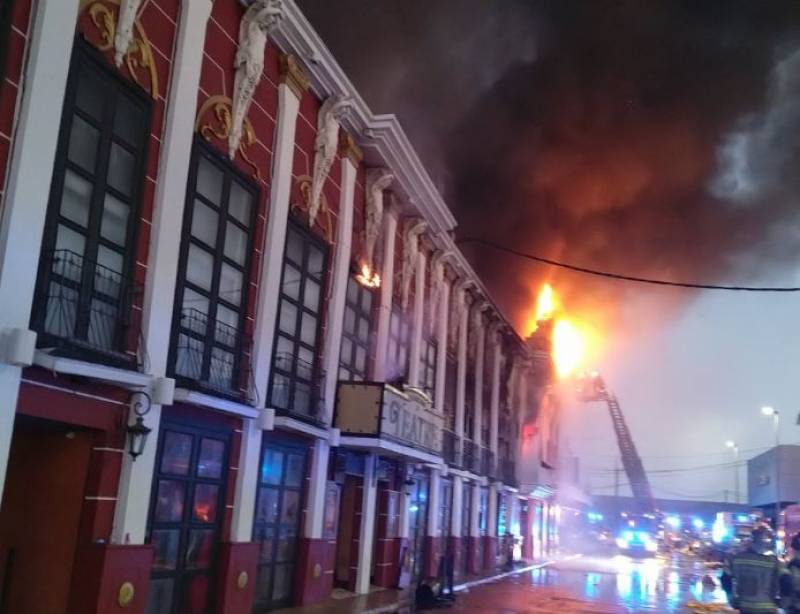
Police investigations are still ongoing as to what caused the tragic fire, but it seems that what happened is this:
That night, at the Teatre and Fonda Milagros nightclubs – two separate discotecas that are housed in what was originally one single premises – there was a party night going on with sparkler guns being waved around. It was dark, there was loud music blaring and alcohol was flowing freely.
At around 5.50am, one of those sparklers set fire to the electrical cabling on the ceiling of the Teatre, cutting off the electricity and shutting off all the lights except the emergency exit lights. The place was plunged into darkness save for the light of the flames, which spread rapidly throughout the whole building, being sucked into the air vents to shoot out like a flamethrower into the Fonda nightclub next door.
More than 150 people who were inside at the time all scrambled to get out, or else became frozen with fear. There are reports of heartbreaking voice messages being sent to loved ones on the outside from terrified partygoers who thought it would be the last message they ever sent. A total of 13 people who were all on the upper level of the Teatre were unable to escape due to the raging inferno, and lost their lives.
Firefighters were on the scene quickly, and managed to extinguish the flames fairly fast while assisting others to get out of the burning building to waiting ambulances for medical help.
Up to 15 people were reported missing, and were feared dead as it took fire crews and police a while to find and identify the charred bodies. However, the 15 were all eventually located and the official death toll stands at 13.
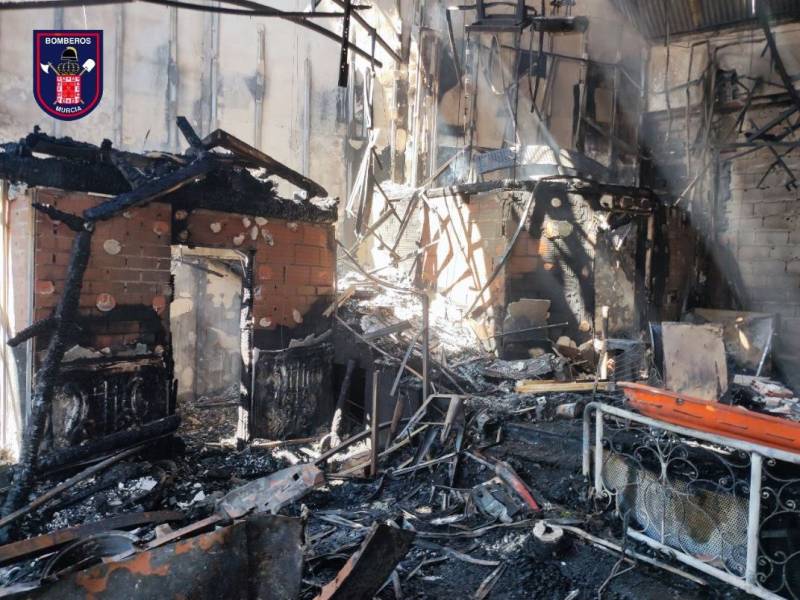
Politicians from across the left-right divide and from all over the nation sent their condolences to the victims’ families. A minute’s silence was held in many towns across Murcia and the flag outside the regional government was flown at half-mast for two days. It was the deadliest nightclub fire in Spain since the blaze that tore through ‘Flying’ in Zaragoza in 1990, which left 43 dead.
As if all that wasn’t bad enough, what came next was truly bizarre.
Just one day after the fire, on Monday October 2, Murcia City Council came out with the stunning announcement that the Teatre nightclub had actually been ordered to close way back in January 2022, but that it had remained open in defiance of the law.
The immediate question on everyone’s lips was, “But how?!”. The Atalayas area where the fire broke out is a well-known and much-frequented part of the city, with a large shopping centre and a whole street full of clubs which are jam-packed every weekend. Police knew exactly what was going on there every Friday and Saturday night. The authorities must have been aware of which clubs were open, especially if they had been given a cease-and-desist order. So why didn’t they force the club to close in that year-and-a-half period?
The owners of both nightclubs denied that they had ever been told to shut down, but could not produce their operating licences since they had been inside the building at the time and been burnt to a crisp. Was it a misunderstanding? Was there a miscommunication somewhere along the line and the closure order had not been transmitted to the proper parties? Or was there deliberate malfeasance in play?
Both the City Council and a platform being set up by the relatives of the deceased have vowed to prosecute those who are found to be responsible for the fire. In the case of the Council, they may have shot themselves in the foot there as it may involve them prosecuting themselves if they are found not to have correctly enforced the closure order.
For good measure, they have indefinitely suspended the municipal technicians who were on the case of the fire safety checks for those nightclubs. The victims’ families, meanwhile, could be liable to win up to 180,000 euros each in compensation, depending on the results of a court case which has yet to begin and which will undoubtedly drag on for a long time in Murcia.
In the meantime, other cities around the Region like Cartagena and Lorca are stepping up their efforts to ensure the fire safety protocols for their nightlife venues, bars and restaurants are all in order and that the operating licences are valid. Lorca is even setting up a specialist “multidisciplinary” unit for that very purpose.
Murcia Council has admitted that there are more venues in the city that are open illegally, and you can bet they’re going to crack down hard on those right now. They have also made psychological support available to the victims who were in the clubs at the time, to their loved ones, and to the emergency services staff who were on duty that night and who may have been traumatised by what they saw and experienced.
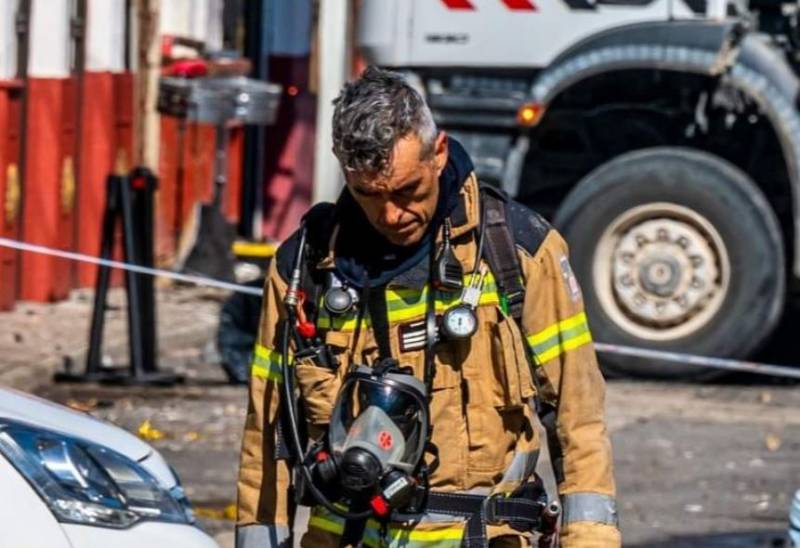
It’s been a week now and this saga is nowhere near over. The emotional and psychological damage done to all those will take years to heal, and the lives that were lost can never be brought back or replaced. Now begins the long journey for those affected to find closure and for anyone who might be deemed to be responsible to be held accountable for their actions, and if the back-and-forth, twisted tale of “he said, she said” of the last week is anything to go by, it will be a drawn out and painful experience for everyone involved.
Spain will host FIFA World Cup 2030
In other news this week, sports fans and businesses up and down the country are rubbing their hands together in glee as Spain – together with neighbours Portugal and Morocco – has secured its bid to host the 2030 FIFA Football World Cup. The trio beat off pretty stiff competition from all over the world, but they will have to share the glory with three other countries: Uruguay, Paraguay and Argentina.
This is because, for the first time ever, FIFA has decided to spread the 48-team tournament across more than one continent. As such, the 2030 edition of the foremost soccer competition will be split between six nations and no fewer than three continents.
Uruguay, Argentina and Paraguay will host the inaugural matches of the Centennial World Cup. The rest of the group stage and the 16 quarterfinals, semifinals and final will be played in Spain, Morocco and Portugal. Specifically, Spain will have ten venues and will host the grand final of the 2030 World Cup. Portugal will have three headquarters and Morocco will have 4 or 5.
“In a divided world, FIFA and football are uniting,” said FIFA’s president, Gianni Infantino, describing the Morocco, Portugal and Spain bid as “a great message of peace, tolerance and inclusion”.
However, not everyone is best pleased about the controversial decision and environmentalists have slammed FIFA for caring more about promoting the competition than climate change. Fans, too, have had their say, with many claiming it will be impossible to follow their teams through the World Cup when the matches will be held so far apart.
Entire abandoned Spanish village up for sale again… but for twice as much!
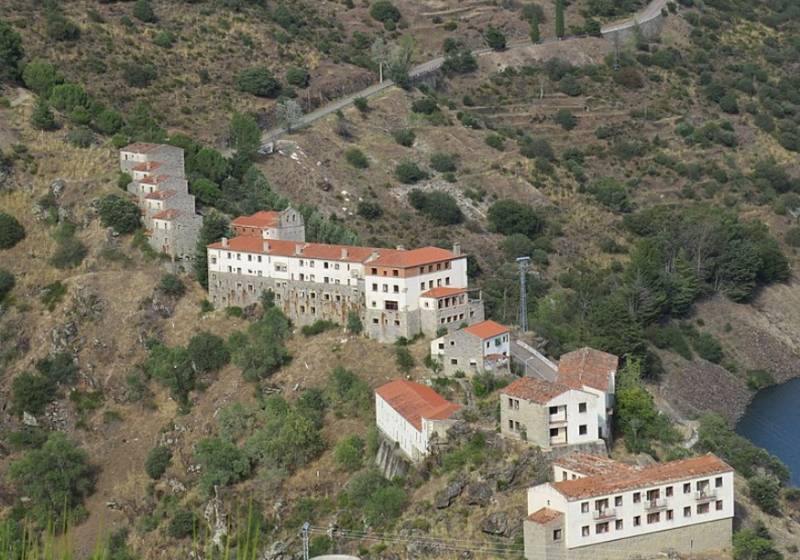
From the World Cup to world-famous, one Spanish village is, at this stage, known pretty much everywhere after making the headlines last year. Salto de Castro is a completely abandoned town in Zamora in north-western Spain, initially built in the 1940s to house the families of workers drafted in to build a dam. The project was finished and by 1989, the 400 square metre village was empty.
This ghost town stood eerily silent until last year, when it made global news after coming back on the market and the entire site, containing 44 homes, a bar, a church, a school, a hostel, a swimming pool, sports areas and an old Guardia Civil barracks, was snapped up by Toledo businessman Óscar Torres for just 300,000 euros.
Now, having completed having completed an architectural project for the rehabilitation of the village, he’s put Salto de Castro back on the market – at almost double the price he bought it for.
At 580,000 euros, it’s still something of a bargain, and property experts believe it would take an additional 2 million to make the village 100% workable and to become profitable.
Murcia
While Murcia was mainly focused on recovering from the shock of the dreadful fire this week, there were other developments that may have slipped under the radar.
For one, the regional international airport has announced its autumn flight schedule, which will begin on November 1. A lot of airports change their flight destinations between summer and winter due to the reduced demand in the low season. At Murcia Airport, this change is especially pronounced as the number of flight destinations available from the airport are going from 22 this summer to just 9 cities in 5 countries.

Specifically, Corvera will have flight connections with Birmingham, London Gatwick and Manchester (all in the United Kingdom); Barcelona, the Canary Islands and Madrid (all in Spain); Dublin (Ireland); Oujda (Morocco); and Prague in the Czech Republic, but only for the December long weekend, which is between December 6 and 11.
So not many options for anyone wishing to fly to or from Murcia this winter. What’s most incredible, though, is that this is actually fewer flight destinations than they had for the autumn/winter season last year! While the aim is to grow the airport and get more people and more flights, it seems Murcia is going the opposite way.
While they are gaining new connections with Madrid and Barcelona this December, they are losing others that were present last winter, including the Air Arabia flight to Casablanca and the three flights operated by TUI to cities in Belgium.
The winter season will last from November 2023 until March 2024, when there will once again be an increase in the number of destinations for the summer… and hopefully some more growth for the airport at that point!
What definitely is growing is the number of African lions at the Murcia zoo. Three new African lion cubs were born at the Terra Natura Murcia park and zoo just a few weeks ago, bringing the total number of lions there to seven.
The cubs, two males and a female, have been named Makhulu, Silbán and Irati and all are in good health, as can be seen in a cute video the zoo has shared of them with their mother.
African lions are an endangered species, and over the last two decades, the population of African lions in the wild has decreased considerably. Any new addition to the species in captivity is welcomed by the international community, and so the initiatives of parks such as Terra Natura Murcia for its breeding and conservation in captivity essential.
The three lion cubs will remain in the park for at least the first two years, which is the time when they have the strongest bond with their mother, so you have until then to go and see them. In fact, to celebrate the arrival of the lions, Terra Natura has activities centred around them every weekend in October, so don’t miss out!
Another thing you’ve got to be sure not to miss out on are the great bargains available at what has been named ‘Spain’s Cheapest Supermarket of 2023’, and it’s a brand which is located in the Region of Murcia.
The list of Spain’s cheapest place to shop was commissioned by the Organisation of Consumers and Users (OCU), and it found that the Alcampo supermarket in Murcia shares the top spot with stores from the same chain in Vigo, Castellón, Teruel, Valencia and Gijón.
It turns out that, according to the survey, which examined some 236 products that generally make up a regular grocery haul, the same supermarket chain can have very different prices in its stores located in different areas of the country. Overall, the best value places to shop in Spain are La Rioja, Galicia and Murcia, while Madrid is, unsurprisingly, the most expensive place to do your weekly food shop.
Your average, basic basket of shopping has increased by 14.1% in the last year in Spain, with an average annual expenditure of 6,019 euros per household. The cost of 90% of the total products the study examined has increased in the last year, with only a few products dropping in price, including sunflower oil, Canary Islands bananas and fresh cheese. The OCU study concludes that it is possible to make savings of 1,056 euros on average per year depending on the supermarket you choose.
Lastly, if you’re looking to get out and do some activities in the Murcia sun this weekend, you could do worse than the Torre Pacheco fiestas, which start this Friday and last until October 15.
The Mar Menor town is celebrating its fiestas in honour of the Virgen del Rosario, and the town centre will be filled with events and activities, including the popular parade of floats on Thursday October 12, as well as the usual selection of fairground attractions and fun events like tug of war and a melon-throwing competition, almost all of which is free of charge!
Check out our EVENTS DIARY for more ideas of what to do in the Region of Murcia:
Spain
The new Animal Welfare Law started making waves long before it came into effect on September 29, a week ago, and the pioneering piece of legislation really does change the entire landscape not only for pet owners, but for breeders, vets and animal-related businesses too. Possibly the measure dog owners are most excited about is the new rule stating that dogs in Spain must be catered for in all public places, including bars and restaurants, hotels, supermarkets and transport.
 Essentially, the regulations says that these public venues must make provisions to welcome animals, providing “they do not constitute a risk to people or other animals”.
Essentially, the regulations says that these public venues must make provisions to welcome animals, providing “they do not constitute a risk to people or other animals”.Under the legislation, City Councils will also have to promote access to beaches and parks for pets, particularly dogs, but this article is expected to hit a few sticking points, since it could well conflict with regional regulations in some areas. Furthermore, in the case of private establishments, the decision of the owner of the premises on whether or not to permit pets will always prevail.
Now that there’s no problem bringing your furry friend on the train, you might want to check out Renfe’s super sale, where tickets are on offer for as little as 7 euros for travel across Spain and even over the border to France. But you’ll need to hurry, as the ‘superprecio’ event is only running until Tuesday October 10.
The promotion is available for trips from October 23 until 2024 for travel to hundreds of destinations on thousands of AVE, Avlo, Alvia, Euromed and Intercity trains.
With this latest promotion, Avlo trains to top destinations like Madrid, Alicante and Barcelona start at just 7 euros, while those looking to travel further afield can grab a seat to France on Renfe’s International AVE from only 29 euros.
What’s more, customers availing of the Superprecio offer can upgrade to the ‘Elige’ option for just one euro more (except AVE International), which affords additional benefits such as schedule changes and cancellations.
Sadly, travel in the Canary Islands is facing a lot more disruptions at the moment, at least for tourists. The drivers of holiday coaches and buses have gone on strike, meaning that visitors won’t be ferried on planned excursions or trips to the many famous sights.
The industrial dispute over pay began on Monday October 2 and further work stoppages were scheduled for October 4, 7, 9, 11, 14, 16, 18, 21, 23, 25 and 28.
As is the case with flights during periods of industrial actions, the government of the Canary Islands is obliged to ensure minimum services, so essential transport to schools, hospitals and medical centres has been guaranteed and holidaymakers should have relatively few problems getting to and from the ports and airports.
Chances of a speedy resolution appear to be slim though, as employers are adamant such extravagant pay increases can’t be maintained given the rising cost of fuel in Spain.
Alicante
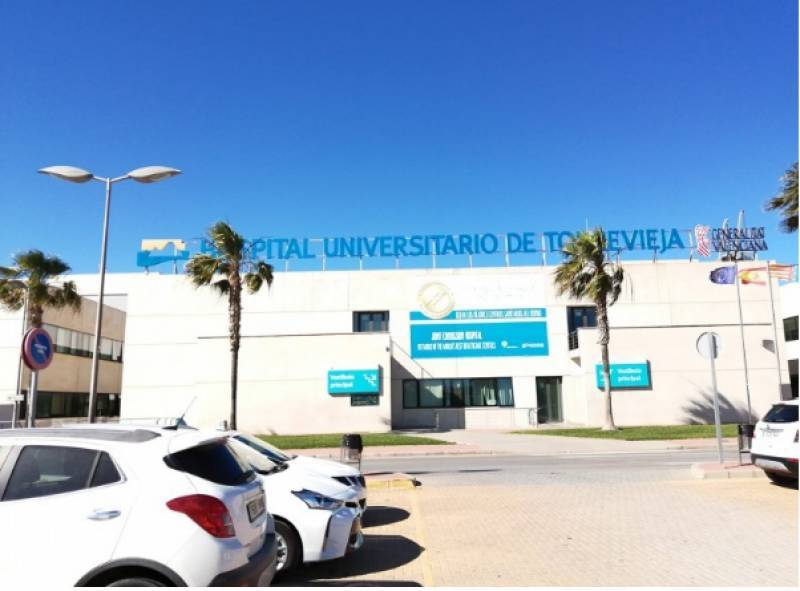 It’s fair to say that the reputation of Torrevieja University Hospital, once considered one of the very best in Spain, has taken a bit of a battering since the Valencian government assumed state control of the facility back in 2021. And this latest debacle isn’t likely to help matters much.
It’s fair to say that the reputation of Torrevieja University Hospital, once considered one of the very best in Spain, has taken a bit of a battering since the Valencian government assumed state control of the facility back in 2021. And this latest debacle isn’t likely to help matters much.The hospital’s insurers have been forced to pay 450,000 euros in compensation to a woman whose arm had to be amputated after a clear case of medical malpractice.
The 65-year-old patient arrived at the clinic in January 2021 for what should have been a straight-forward operation on her shoulder. While she was in the operating theatre, the surgeon noticed a macroscopic vessel that appeared to be bleeding. He made the split-second assumption that the bleed was coming from a vein rather than an artery and stopped the flow.
Shortly after the procedure, the patient suffered arterial ischaemia that developed into deep vein thrombosis which was left untreated for more than 48 hours, “making the amputation of the left limb inevitable.”
Shockingly, it’s not the first time the hospital was found guilty of such negligence and in April last year, the Provincial Court of Madrid ordered Torrevieja Hospital and the Lo Marabú health centre in Rojales to pay 250,000 euros in compensation to the family of a two-year-old child who died following “repeated medical errors”.
It’s not too often lately that Ryanair gets good publicity, but the budget airport is making all the right moves in Alicante and has announced this week that, for the winter season, it will operate flights from Alicante-Elche Airport to three exciting new destinations: Budapest in Hungary, Paderborn in Germany and Warsaw in Poland.
This is in addition to four new city break options from nearby Valencia Airport, to Birmingham in the UK, Memmingen in Germany and Wroclaw and Warsaw, both in Poland.
In total, this winter Ryanair will offer 68 routes and will increase the weekly number of flights available to and from 42 destinations from Alicante, including London, Brussels, Dublin, Milan and Manchester. This is obviously in stark contrast to what’s happening (or not happening!) at Murcia Airport.
To celebrate the launch of the winter schedule in Alicante, the airline is offering fares from just 29.99 euros, which are now available on the Ryanair website and mobile app.
Hopping over to easyJet now and passengers aboard flight EZY3107 from Glasgow to Alicante endured a frustrating delay this week when their plane was forced to divert to Birmingham due to a medical emergency after barely an hour in the air.
According to the airline, the plane left the Scottish airport at 9.36am and was forced to turn around over Wales before touching down in the UK as one of the passengers required urgent medical assistance.

Paramedics met the aircraft on arrival where the passenger was transferred to hospital and the flight was eventually allowed to continue to Alicante.
Oktoberfest has to be the most famous beer festival in the world and Spain is never one to be left out of the celebrations. That’s why this month, the peaceful town on La Nucia in the Marina Baixa region of Alicante will be transformed into a Bavarian playground, complete with a huge beer and food tent, traditional German music and no fewer than 300 kegs of that iconic tipple, Erdinger.
The opening ceremony of the 35th edition of the celebrations began at 7pm on Thursday October 5 and the festival will run every day between 6pm and 12.30am until October 15 (on Sundays and the public holiday of Valencia Day, until 1am). Throughout the 11 days, visitors can sample traditional German dishes like knuckle, wurst and sauerkraut, in addition to the world-famous beer of course.
 The Valencia Day in question is this coming Monday, October 9, which is a public holiday in the whole Valencian Community, including the province of Alicante, for the occasion of the ‘Día de la Comunidad Valenciana’. Banks, shops, schools and businesses will be shut for the day.
The Valencia Day in question is this coming Monday, October 9, which is a public holiday in the whole Valencian Community, including the province of Alicante, for the occasion of the ‘Día de la Comunidad Valenciana’. Banks, shops, schools and businesses will be shut for the day.Every autonomous community in Spain has its own regional holiday, and October 9 is the date set for Valencia’s. It comes just 3 days before a national holiday for the whole country on Thursday October 12 for the ‘Día de la Hispanidad’ or Spain Day, when shops will once again be shut!
The history of the Day of the Valencian Community dates back to 1238, when King James I of Aragón reclaimed the region from the Moors as part of Spain’s ‘reconquista’ period. It is a day for celebrating Valencian identity, traditions and the regional minority language valenciano. It also happens to coincide with the Catholic Feast of San Dionisio, the patron saint of lovers, so there are some amorously themed activities going on too. For instance, ont his day men are supposed give the gift of a silk scarf to their sweetheart which contains a delicious assortment of sweet marzipan treats called ‘Mocaoràs’, which are the typical food of this Spanish feast.
Don’t forget to follow the Costa Blanca What’s On and Where to Go Facebook group for more stuff coming up around Alicante province!
Andalucía

Andalucía’s flight schedule could be giving Alicante a run for its money shortly as in Malaga, tourism minister Héctor Gómez has expressed his willingness to extend the direct flight between Malaga and New York, which resumed this summer, so that it operates year-round.
Last year, the Costa del Sol beat off stiff competition from Seville to secure the connection with the Big Apple, and Mr Gómez is keen to make Malaga a “reference destination” for tourists from North America.
Tourism numbers, particularly the number of overnight stays, have skyrocketed in the Costa del Sol this year, surpassing 2019’s pre-pandemic figures, but Malaga isn’t the only city in demand, since the Spanish Tourism Ministry is confident that a new connection will be up and running between the Valencian Community and New York by next summer.
Over in the Andalusian capital, the authorities in Seville have pushed through new legislation that will crack down heavily on disruptive stag and hen dos, following in the footsteps of Malaga, which finalised similar laws last month.
Mayor José Luis Sanz said that Seville “has no interest whatsoever” in any tourism generated from wild bachelor and bachelorette parties and from now on, it will be forbidden to walk the streets half naked or in underwear alone. He’s also considering prohibiting “obscene exhibitionism” and explicit fancy dress costumes that could cause offence.
Mr Sanz said that while Seville will still welcome well-behaved partiers, what the authorities won’t “view favourably are groups of people dressed as whatever, with brass bands behind them, disturbing the many residents of Seville – especially in areas of the historic centre – who also have the right to enjoy their city.”
He hasn’t specified when the crackdown will begin or whether flouters will face a fine, but in the Costa del Sol rowdy stags and hens are first given a warning by police to clean up their behaviour.
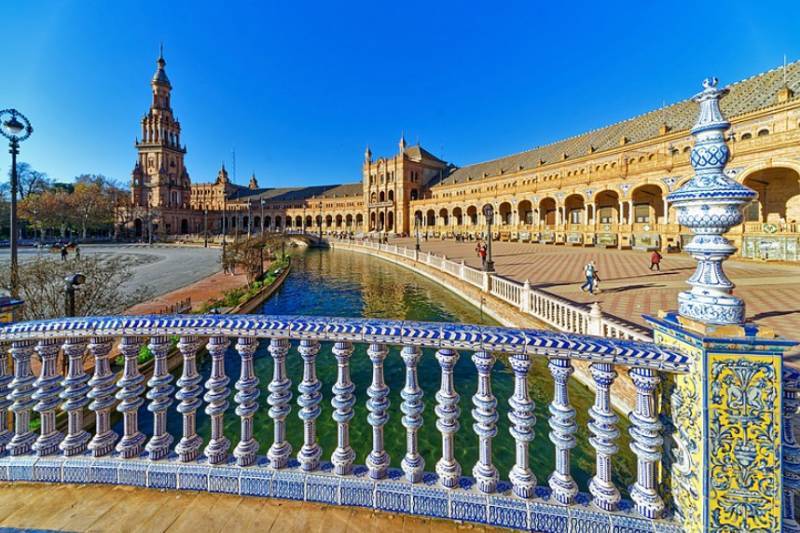
You may have missed…
- Important changes to Spanish pension contributions come into force.
A major change to how pension contributions are calculated in Spain has come into force on Sunday October 1 and will be welcomed by employees and self-employed workers up and down the country... - Zelenskiy arrives in Spain for European Community Political Summit.
Ukrainian President Volodymyr Zelenskiy set foot on Spanish soil for the first time since the start of the Russian invasion more than a year and a half ago. President Zelenskiy was in Granada for a political summit during which Spain promised to deliver more Hawk missiles and military aid to Ukraine. - Young Briton scalped in horror Ibiza crash.
A young British man has had a close shave with death after a hire car in which he was travelling as a passenger collided with another vehicle in Ibiza on September 8. However, the 30-year-old lorry driver suffered life-altering injuries and his scalp was completely ripped from his skull in the horrifying collision. - Devastating August wildfire reignites in Tenerife.
The terrifying forest fire that tore through Tenerife in mid-August spontaneously reignited in the Santa Úrsula area of the island on the afternoon of Wednesday October 4 and quickly spread to the upper reaches of the municipality, forcing the evacuation of more than 2,600 people. - Miura 1 space rocket lifts off from Andalucia this weekend.
After two failed attempts due to windy weather conditions and a technical glitch, the Spanish built Miura 1 rocket will be launched into space this coming weekend. Hopefully it will be third time lucky for the Huelva launch, which is scheduled for 2am on Saturday October 7.
There we go, that’s all for this week. Remember that next Thursday, October 12, is a national holiday in Spain and many businesses and shops will probably be taking the Friday off to make it a long ‘puente’ too. But we’ll be back with a new edition of your Editor’s Roundup Weekly Bulletin on that day (Friday 13th!).
See you then!
Contact Murcia Today: Editorial 000 000 000 /
Office 000 000 000




















